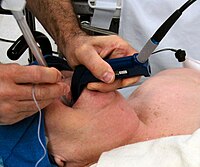
Photo from wikipedia
During the recent severe acute respiratory syndrome coronavirus 2 (SARS-CoV-2) pandemic, the surge of patients with acute respiratory failure led to an increase of utilization of noninvasive respiratory support (RS),… Click to show full abstract
During the recent severe acute respiratory syndrome coronavirus 2 (SARS-CoV-2) pandemic, the surge of patients with acute respiratory failure led to an increase of utilization of noninvasive respiratory support (RS), even outside the intensive care unit.1 However, prolonged noninvasive RS before endotracheal intubation can be related to patient-self-inflicted lung injury (P-SILI).2 In recent years, the role of P-SILI has in fact emerged: patients with severe lung injury who breath spontaneously have a high respiratory drive, resulting in excessive transpulmonary pressure and increased vascular transmural pressure that can aggravate the pre-existing lesions. A recent paper3 by Ahmad et al. aimed to evaluate the impact of duration of noninvasive RS before endotracheal intubation on outcomes of COVID-19 patients requiring veno-venous extracorporeal membrane oxygenation (V-V ECMO) for severe acute respiratory distress syndrome (ARDS). The authors hypothesized that prolonged RS may induce P-SILI,2 which may promote nonreversible lung alterations. They found that prolonged RS before intubation was associated with a lower probability of successful ECMO weaning at 50 days, whereas hospital mortality did not differ between groups. To verify Ahmad et al.’s findings in a control population, we performed a retrospective analysis in our COVID-19 ECMO cohort.
Journal Title: ASAIO Journal
Year Published: 2022
Link to full text (if available)
Share on Social Media: Sign Up to like & get
recommendations!